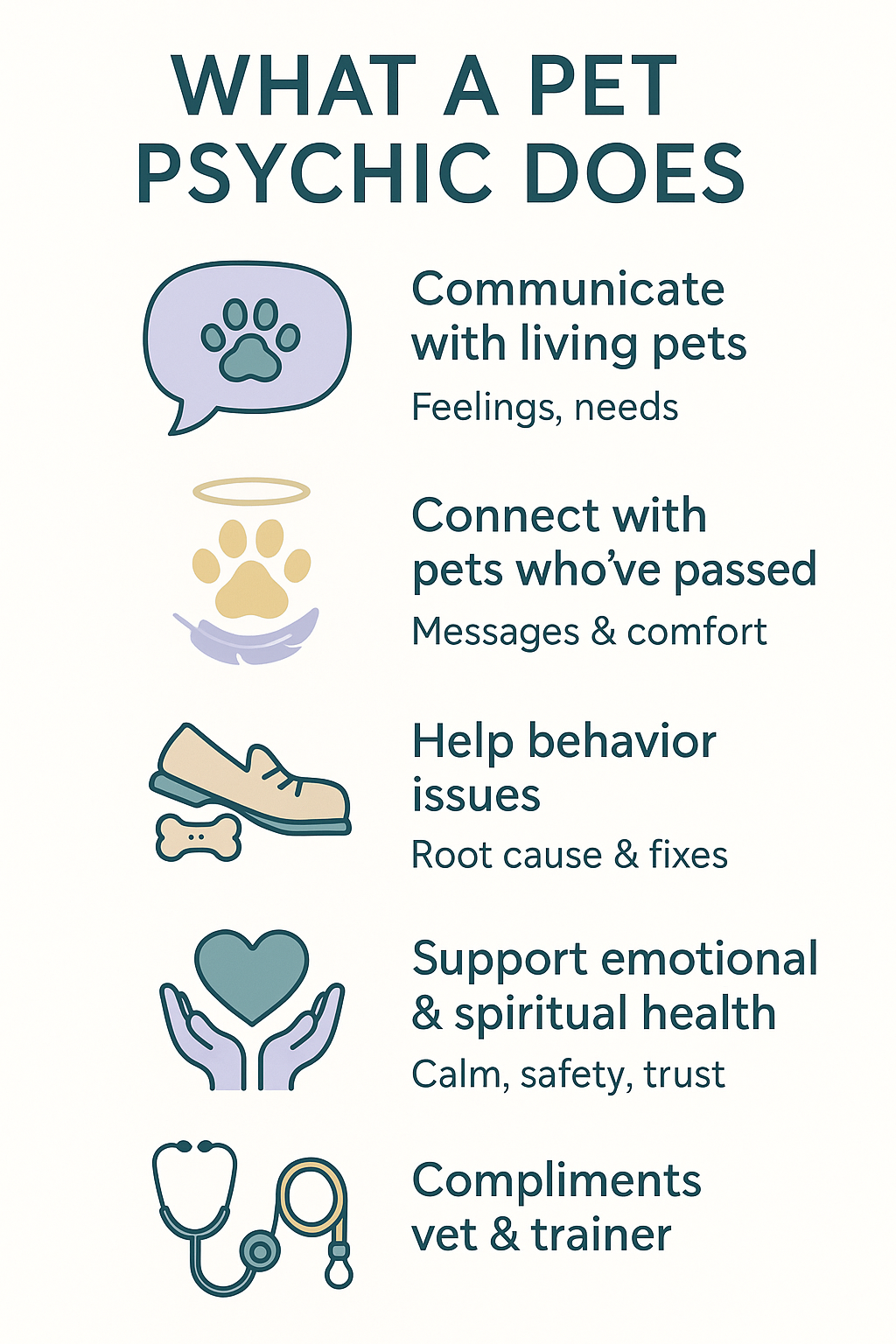Introduction: Pets Speak—But Do We Listen?
If you’ve ever had a dog sit by the door five minutes before you came home or a cat stare at you like it knows your deepest secrets, you’ve experienced a taste of animal intuition. Pets are always communicating, just not always in ways we humans easily understand.
One woman shared that her cat, Shadow, always sat on her chest when she was unwell—long before doctors confirmed she had a thyroid issue. Pets pick up on things we miss. Enter the pet psychic—the translator between species, a bridge connecting us to the thoughts, feelings, and even spiritual presence of our beloved companions.
Many people think of pet psychics as quirky sideshow performers or as something you’d see in a movie. But real pet psychics do far more than amuse. They provide insight, closure, and connection, validating what many pet owners already feel: our animals know us better than we realize, and sometimes they have messages waiting to be heard.
Beyond the Hollywood Stereotype
Let’s clear something up right away: pet psychics don’t just “mind read” your Labrador or ask your cat to stop knocking glasses off the counter. Instead, they tune into an animal’s energetic and emotional field, much like a psychic connects to human intuition. Some sense emotions as colors or impressions, while others hear words, images, or even physical sensations.
What makes it different from training or medical advice is that pet psychics address the soul level. They uncover why your parrot screams at certain times, why your dog refuses to walk past a specific corner, or what message your cat may have for you after it has passed.
(Authoritative link: Psychology Today on animal consciousness)
The Range of What Pet Psychics Do

Pet psychics wear many hats, depending on what the client needs.
Communicating with pets alive: uncovering fears, explaining odd behaviors, or helping owners understand what comforts their animal most.
Connecting with pets who have passed: offering closure by relaying specific details or messages.
Helping with behavior issues: understanding whether an animal acts out from fear, boredom, or emotional imbalance.
Supporting in health matters: while never replacing a vet, psychics can point out discomfort or emotional stress that complements medical insight.
The Energetics of Pet Communication
Animals are masters of nonverbal communication. They read our tone, posture, and even moods better than most people do. Pet psychics go a step further, tuning into the vibrational signals animals radiate. These impressions might come as images, flashes of memory, or emotional “downloads.”
If you’ve ever just known your dog was lonely or sensed your cat was upset without obvious cues, you’ve touched the same intuitive field pet psychics work with daily. The difference is training, trust, and refinement.
How Pet Psychics Differ from Trainers or Vets
Trainers focus on shaping behavior through conditioning. Vets diagnose physical health issues. Pet psychics fill in the invisible layer—emotional and spiritual communication. Together, these three perspectives create a holistic approach: body, mind, and spirit.
(Authoritative link: American Veterinary Medical Association on pet behavior)
The Science of Animal Intuition
Skeptics often ask: is there any science behind this? While psychic ability itself remains beyond traditional science, animal intuition has been studied. Pets anticipate their owners’ return, sense illnesses, and react to emotional states.
Many pet owners report uncanny moments—like a cat meowing right before an anxiety attack or a dog nudging someone seconds before a phone call with bad news. Pet psychics simply extend and refine this innate human-animal connection.
Misconceptions and Skepticism
Like all psychic practices, pet psychic work has its doubters. Common myths include:
“It’s all guessing.” Yet many readings include specific validations—such as describing a pet’s favorite toy hidden in another room.
“It’s just reading body language.” True in some cases, but pet psychics often work with absent or deceased animals, where body language is not observable.
“It replaces veterinary care.” Ethical psychics never claim to substitute professional medical care—they complement it.
Benefits of Consulting a Pet Psychic
Why do people seek pet psychics? Because the benefits often outweigh the skepticism.
Emotional closure after the loss of a pet.
Understanding behavioral quirks that create household stress.
Deepening the bond by honoring what the animal needs.
Validation of an owner’s intuition, building confidence in their connection.
(Authoritative link: Greater Good Science Center on human-animal bonds)
How to Prepare for a Pet Psychic Reading
Going to a pet psychic is not like a routine vet appointment. You don’t need lab work or vaccination records, but you should bring an open heart.
Photos of your pet, alive or passed.
Clear but open-ended questions (“What does my dog need more of?” rather than “Why is he mad at me?”).
Patience and curiosity—psychics work with impressions, not linear translations.
Avoid trying to “trick” the psychic with false information. Authentic collaboration leads to deeper insight.
Developing Your Own Pet Intuition
You don’t have to be a professional psychic to connect better with your pets.
Spend a few minutes daily in quiet presence with them—no phones, no distractions.
Meditate while imagining you’re seeing the world through their eyes.
Journal impressions you get about their moods and compare them to behavior.
Many pet owners find that once they start listening differently, their bond becomes richer and more attuned.
Closing Thoughts: The Language of Love Needs No Words
What does a pet psychic do? They give animals a voice in human language. But in truth, our pets have been speaking to us all along—through their eyes, their behavior, and their energy. Pet psychics simply help us hear it more clearly.
When you open yourself to the idea that your pet has wisdom, emotions, and even spiritual messages, you stop seeing them as “just animals.” You see them as companions on your soul’s journey.
One man said a psychic’s message from his late dog—“check under the porch”—led him to a stash of hidden toys. That validation erased years of doubt and reminded him their bond hadn’t ended, only transformed. And that realization is perhaps the most powerful gift a pet psychic can offer.
Pet Psychic FAQ
What does a pet psychic actually do?
They tune into an animal’s energy and emotions to translate needs, preferences, and messages (including from pets who’ve passed).Is this the same as training or veterinary care?
No. Training shapes behavior; vets address health. Pet psychics add the emotional–spiritual layer and should complement—not replace—pros.How do pet psychics receive information?
Through impressions, images, emotions, words, or body sensations—similar to intuition but more focused and practiced.Can a pet psychic help with behavior problems?
Often, yes. They can uncover root causes like fear, boredom, grief, or environmental stress and suggest supportive changes.Can they diagnose illness?
No. Ethical pet psychics never diagnose. They may sense discomfort patterns, then encourage you to consult a veterinarian.Do readings work if my pet isn’t present?
Yes. Many readings are done remotely using a photo or description, focusing on the pet’s energy field.Can a pet psychic connect with a deceased animal?
Yes. Many offer mediumship, bringing through validating details and messages for comfort and closure.How accurate are readings?
Accuracy varies by reader and situation. Look for specific validations (unique habits, favorite toys, routines) and practical, testable guidance.What should I bring to a session?
A recent photo, your pet’s name, age, living status, and a short list of open-ended questions you truly care about.How can I prepare myself?
Be calm, curious, and collaborative. Set an intention like “Help me understand what supports my pet’s highest good.”How long does a session take?
Typical sessions run 30–60 minutes. Follow-ups are common for behavior plans or grief support.Will my pet understand the process?
Animals respond to your energy. If you’re relaxed and open, they tend to be, too—whether present or remote.Can pet psychics help with multi-pet households?
Yes. They can “meet” each animal’s energy and suggest changes to ease territory tensions, feeding stress, or sibling rivalry.What if the message doesn’t make sense right away?
Note it. Many details click later (a hidden toy, a neighbor’s habit, a routine you forgot), or after you try a suggested change.How do I spot an ethical pet psychic?
They set boundaries, avoid medical claims, welcome questions, respect consent, and never use fear to sell services.How soon can I book after a pet passes?
Anytime. Some prefer a few days or weeks to process grief; others find immediate connection comforting.Can children join a session?
Yes, with guidance. It can deepen empathy and teach gentle, respectful ways to relate to animals.Do readings differ by species?
The core process is similar, but personalities vary. Dogs often relay feelings about routines; cats share environment preferences; horses highlight body comfort and trust.Can I develop my own pet intuition?
Absolutely. Sit quietly with your pet daily, breathe together, journal impressions, and compare them with behavior over time.What’s one sign a reading helped?
You notice tangible shifts: calmer routines, fewer stress behaviors, better mutual understanding, and a lighter household mood.





Using a pet psychic to help with behavioral issues or to find a missing pet adds a unique layer of support. It appears this practice is more about understanding the non-verbal cues and energies that pets emit, rather than replacing conventional methods.
The idea of communicating with deceased pets to find closure is compelling. Grief over a lost pet can be profound, and if a psychic medium can provide solace and help in the mourning process, it could be a valuable resource for some pet owners.
The concept of telepathy and aura reading in the context of pets is quite intriguing. While traditional veterinary and behavioral interventions are important, introducing an element of spirituality might offer additional comfort and insight for some pet owners.
It’s fascinating to consider how pet psychics might tap into the energy and emotions of our pets. I wonder about the scientific basis behind such practices, although it certainly seems like a comforting option for pet owners dealing with distressing situations.
Incorporating pet psychics into pet care routines is an unconventional approach that might not appeal to everyone. However, understanding our pets’ emotional states and needs from a different perspective could potentially enhance the bond between pets and their owners.
This article is a fascinating insight into the world of pet psychics. The idea that someone can connect with the energy of our pets and help us understand their emotions and behaviors is truly intriguing. It makes sense that our pets, who are so attuned to our feelings, could benefit from this specialized communication. I especially appreciate the mention of helping pets who are mourning or anxious due to changes in their environment or routine. It’s heartwarming to know there are ways we can improve their well-being. Overall, a compelling read for any pet owner!
Comments are closed.